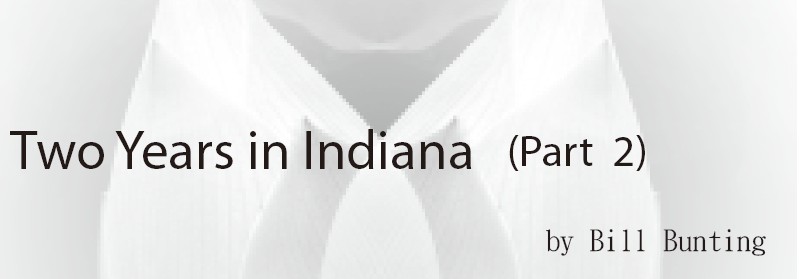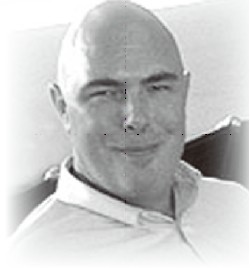
Two Years in Indiana(part 2) /by Bill Bunting
One might think that so far this has been a dissertation on the things that
separate us one from another. It is true that there is a large cultural and
linguistic barrier to cross between ancient China and modern America, it is also
true that there are substantial philosophical differences that separate people
one from another, even within single families. It is also true that as human
beings spinning through space on this tiny planet that we all have much more in
common than we have in difference, and it is these common bonds of the human
condition that make this work possible. The words I-Kuan Tao translated mean
"The Tao that unifies all with the one" and when we contemplate the depth of
that statement its power is overwhelming. No matter a person¡¦s country of
origin, language, culture, or circumstance, we all have common needs. We need to
be fed, nurtured, loved and accepted, clothed, housed, and to feel useful. Those
needs are universal. Every single person on the planet turns their eyes skyward
at some point and wonders what will happen to them when they die, this question
is universal. Every person came from parents, who came from parents, who came
from parents. This continuum we call family is universal among humans. We all
strive in some way to better our condition and circumstances. No matter who we
are, or where we are, we seek a better life for our children than we had. Every
person faces challenges and problems. Every person faces choices, some of which
are difficult. Each life encounters a certain amount of joy, and a certain
amount of pain. We all at some point are at the very top of the wheel, and
sometimes at the very bottom. This cycle has continued from the very beginning
of humanity.
Into this cycle, the I-Kuan Tao has the ability to bring order, discipline, reason, and truth to the process of living.
One of the challenges we face most often in spreading the Tao, is the absence of understanding as to what exactly the true teachings of the Tao are. There is a widespread misunderstanding which when paraphrased sounds something like this. "The Tao encompasses all things, therefore everything is part of the Tao, and since everything is part of the Tao, nothing is wrong, and everything and anything is okay". As with every misunderstanding, this one is based in the truth, but lacks the substance of truth. Those who would say that there is no good or evil in the Tao, no right or wrong in the Tao, that any and every behavior is right do not understand the teachings. While it is true that the Great Tao is neutral, it is readily apparent that good and evil, right and wrong, order and chaos, and many other apparent opposites do in fact exist. They do not exist however, in diametric opposition, but rather as complimentary pairs that help lead us to a right and proper conclusion and path. If we never experienced pain, could we truly appreciate joy and good health? It is in this wisdom that Lao Tzu says "All the world recognizes beauty, therein lies ugliness." Communicating this teaching is central to achieving understanding of the most elementary of truths, and yet seems to be among the most difficult to convey. Overcoming the human desire to pursue the course of least resistance, to choose the higher road, to aspire to unify the self with Tao is perhaps one of the most difficult choices that some people ever make.
So what have we learned in two years in Indiana? We have learned that just as the pioneers of the western frontier struggled and persevered, we too must struggle and persevere. We must improve our own practice, giving up bad habits, and embracing proper conduct so that our example shines before others. While we do this, we must be mindful not to become arrogant or prideful, which leads to destruction. We must remember to be humble, as the common dust, so that we do not exclude anyone from the opportunity to receive the teachings. We must remain upbeat and enthusiastic for the heavenly mission so that others can see our true joy in our devotion. What we begin by rigorous practice after a brief while becomes daily habit and is no longer work, rather it is merely a part of us.
We have learned that just as the original colonists, we must be satisfied with small beginnings that grow into large results and blessings. An enormous oak tree starts its life as a tiny acorn. We must not allow fear of the unknown, fear of failure, fear of our own shortcomings or mistakes to prevent us from making our most sincere effort to spread the Tao, trusting that Lao Mu will take a sincere effort and produce a shining result.
We have learned to save our resources, and to waste nothing because everything is useful somewhere.
We have learned to share what we have and give joyfully to others in need, without judgment or preconceptions, but not to give to the point where our own welfare is damaged or to permit ourselves to be unfairly taken advantage of.
We have learned the wisdom of carefully chosen words, and the power of the spoken and written word, like that of an axe, which might be either a skillfully used tool, or an awesome weapon.
We have learned that in the repetition of the rituals there is both order and focus. Focus on the principles we are commanded to embrace, humility, charity, tolerance, forgiveness, attention to our responsibilities, and performance of our sacred duties. Order is brought to our daily routine that keeps our hearts and minds continually looking towards the Great Tao.
We have learned that discipline, especially self discipline, is a beneficial and worthwhile pursuit. That moderation in all things is the key to material happiness and contentment, and that there is no misfortune so sad as a one who does not know what is enough.
We have learned that sometimes it is sufficient to plant a seed. The path of the Great Tao is so wide and so easy to walk, that many people are unable to see it. It is not within our power to lead another down the path, we only can shine a light on where the path is for each of us, then if someone decides to walk with us for a while, our paths may merge for some time before they separate again and we each go where we are lead. Each person we meet, every soul we touch, who has not received the Tao through initiation, represents an opportunity to plant that seed. Very often we may never know if the seed took root or not, but where and when we can, once planted it is our responsibility to water and care for that seed.
We have learned that just as the pioneers perfected their methods and practices for raising crops, and thriving in a new land, that we too must perfect our methods and practices for raising our crops as well, and through this, bring more people to the Great Tao by a good example, and the proper approach and right teachings at the right time. "The Etiquette and Discipline" says that "A wise person does not waste words", this would imply that we develop the wisdom to know when to be silent as well as when, and how to speak.
We at the Chuan I Fo Tang give thanks to Buddha Maitreya and Lao
Mu, and to the Senior Master and Masters for the opportunity to continue the
heavenly mission of spreading the Tao. There are many others to whom we owe many
thanks, and to each of you, thank you as well. It would not be possible for us
to do this wonderful work here without the support and guidance of all of these
wonderful masters, lay people, and cultivators whom we hold dear in our hearts.
We are truly a family under the Great Tao.
(The end)
¡@